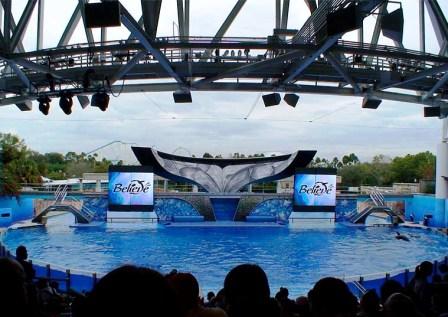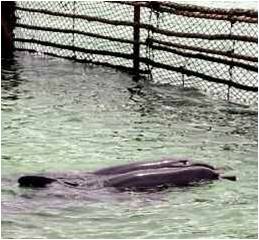A Whale of a Business
Do businesses like SeaWorld traffic in dolphins?
Excerpt from the PBS Frontline investigation: (First aired Nov. 1997)
 In 1997, the PBS program Frontline aired a special investigation A Whale of a Business that focused on the treatment of dolphins who are held captive by SeaWorld and other businesses in the entertainment industry.
In 1997, the PBS program Frontline aired a special investigation A Whale of a Business that focused on the treatment of dolphins who are held captive by SeaWorld and other businesses in the entertainment industry.
In this segment of the program, correspondent Linden MacIntyre questions officials and veterinarians from SeaWorld about the nefarious transactions by which they move whales and dolphins around the world without any easily traceable documents that would track their involvement.
Each of the officials, interviewed separately, denies knowing anything about a particular dolphin transaction, apparently organized by SeaWorld and entertainment parks in Japan and Holland. Their answers are basically: “I have no idea …”
But PBS then reveals that they were, in fact, all in Japan together!
~~~~~~~~~~~~~~~~~~~~~~~~~~~~~~~~~~~~~~~~
LINDEN MacINTYRE Chief Correspondent: Consider the contortions SeaWorld went through to get this killer whale (orca, the largest of the dolphin species) to the United States from Holland. In 1987, Dr. Lanny Cornell wrote to Holland to arrange to get her for a breeding loan, which was all perfectly straightforward and legal. In exchange, he sent three animals called pseudorcas, or false killer whales, to the zoo in Holland. But they were from an unrelated aquarium in Kamagawa, Japan.
Which begs a question: What kind of arrangement would enable SeaWorld, USA, to acquire an animal in Holland, using animals from a zoo in Japan as payment?
BRAD ANDREWS V.P., Zoological Operations, SeaWorld: I don’t- I haven’t seen that type of paperwork. The only paperwork that I was open to, and that is in our record books today, are the different governmental exchanges of the animals going from one facility to another. If SeaWorld had the opportunity to transfer- you can’t transfer somebody else’s animals unless you buy them or you’re going to give them something for them in the future.
LINDEN MacINTYRE: If I’m working for SeaWorld, acquiring a killer whale from an aquarium in Holland, and I’m trading with pseudorcas from a facility in Japan, it’s reasonable to draw the conclusion that I own the ones in Japan.
BRAD ANDREWS: And how did you own the ones in Japan? Did you purchase them from the owners there?
LINDEN MacINTYRE: That’s a good question. I don’t know the answer.
BRAD ANDREWS: Well, I don’t either.
LINDEN MacINTYRE: [voice-over] He should have known about the deal. We’ve since discovered airline documents confirming that Brad Andrews and Dr. Jim McBain were in Japan with Lanny Cornell to move the whales.
LINDEN MacINTYRE: Isn’t it possible that the animals were basically stored in Japan for a rainy day by somebody representing SeaWorld USA?
BRAD ANDREWS: I have no idea.
LINDEN MacINTYRE: Is it reasonable, I mean, or logical?
BRAD ANDREWS: Again, I have no idea. Why would somebody store animals for a rainy day? I don’t store animals in somebody else’s facility for a rainy day and the implication I resent.
LINDEN MacINTYRE: Well, how could Dr. Lanny Cornell have brokered such a deal with Japan?
BRAD ANDREWS: I think you ought to ask him. I don’t know. I haven’t the slightest idea.
Dr. LANNY CORNELL, DVM, Whale Veterinarian: Well, you should talk to SeaWorld about that, if they have that information.
LINDEN MacINTYRE: Well, I already did and then- and they said you should- they said we should talk to Dr. Cornell.
Dr. LANNY CORNELL: Well, you should talk to SeaWorld about it because that’s a SeaWorld transaction.
LINDEN MacINTYRE: I presume I’m dealing with a perfectly–
Dr. LANNY CORNELL: Let me- let me just say this. Nothing illegal transpired, okay?
LINDEN MacINTYRE: Exactly.
LINDEN MacINTYRE: So why can’t you talk about it?
Dr. LANNY CORNELL: Because it happens to be SeaWorld business and not my business.
LINDEN MacINTYRE: Brad Andrews, whom you know, when I asked him “How could Lanny Cornell broker an arrangement between SeaWorld and Kamagawa, Japan, and Harderwijk?” “I think you ought to ask him. I don’t know. I haven’t the slightest idea.” Now, that seems to be- and that’s in writing.
Dr. LANNY CORNELL: Well, probably because he wasn’t involved in the process. So why don’t you-
LINDEN MacINTYRE: He was involved in the process. He was on the-
Dr. LANNY CORNELL: So if you go- [crosstalk] Why don’t you call- you call SeaWorld- SeaWorld’s-
LINDEN MacINTYRE: He was on the airplane with you guys.
Dr. LANNY CORNELL: Contact SeaWorld’s offices and ask them if they want me to discuss this with you and I certainly will.
LINDEN MacINTYRE: [voice-over] In a subsequent letter, SeaWorld’s parent company refused, saying Lanny Cornell’s employment was before they owned the theme parks.
False killer whales, like the ones SeaWorld traded from Japan, are popular performers, if not as glamorous as their charismatic cousins. But the way they’re captured raises uncomfortable questions for marine parks. The Humane Society’s Naomi Rose.
NAOMI ROSE, Ph.D., Marine Mammologist, Humane Society: The dirty little secret of a public display industry is that to remove these animals from the wild is an outrageously traumatic, violent process. It turns out that almost every false killer whale – and they’re not very common in captivity here in the United States, but there are a few. There’s about 20 or 30. And every single one of those animals, it turns out, came from Japan and they came from the Japanese drive fisheries.
~~~~~~~~~~~~~~~~~~~~~~~~~~~~~~~~~~~~~~~~
The complete transcript of this interview is here.
And here is the complete Frontline program and accompanying materials.
~~~~~~~~~~~~~~~~~~~~~~~~~~~~~~~~~~~~~~~~

